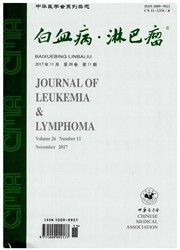

 中文摘要:
中文摘要:
介绍第55届美国血液学会(ASH)年会有关骨髓增生异常综合征(MDS)研究领域对同种异基因移植的评价和展望.初诊MDS患者的年龄低于60岁并有HLA相合的供者,国际预后积分系统(IPSS)评分为中危-Ⅱ或高危,造血干细胞移植(HCT)是合适的选择.对于年龄大于60岁的高危MDS患者,去甲基化药物是标准治疗.移植前对MDS进行全面评价,包括年龄、细胞遗传学异常、合并疾病、外周血细胞减少的程度、生活质量等,对异基因HCT的选择非常重要.
 英文摘要:
英文摘要:
New progress of myelodysplastic syndomes (MDS) in the 55th ASH annual meeting on allogeneic transplantation were reviewed. Even though the IPSS was developed mainly to determine the prognostic risk in newly diagnosed MDS patients, its predictive value concerning posttransplantation outcome has been confirmed in several studies. According to a decision model published a decade ago, patients with intermediate-2 or high-risk MDS by IPSS criteria should be considered for hematopoietic cell transplantation (HCT) at the time of diagnosis if an HLA-matched donor is available at this time. Given the age of most MDS patients, therapeutic interventions are per se often limited to rather nonintensive treatment approaches. This article reviews the current evidence for allogeneic HCT as a therapeutic option in the context of disease- specific characteristics and current available alternative treatments.
 同期刊论文项目
同期刊论文项目
 同项目期刊论文
同项目期刊论文
 期刊信息
期刊信息
